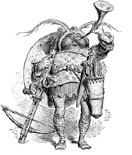
Dispatch from the Dead Letter Office
NEW OXFORD NOTEBOOK
In November 2020 the Vatican released its long-anticipated “Report on the Holy See’s Institutional Knowledge and Decision-Making Related to Former Cardinal Theodore Edgar McCarrick.” It was immediately evident that something screwy was afoot. Consider the timing. Vatican insiders said the report had been completed some six months earlier and was gathering dust on Pope Francis’s desk through the spring, summer, and early fall. That prompted the Los Angeles Times to ask, “What’s the Pope waiting for?” (July 27, 2020).
It seems he was waiting for the opportune moment. The report was finally released — coincidentally or conveniently, depending on your perspective — in the immediate aftermath of one of the most controversial and contested presidential elections in U.S. history, when Americans were distressed and distracted by a vote count dogged by accusations of fraud. Why should that matter? Recall: The report details the astounding malfeasance of not just any high muckety-muck but a predatory American prelate, “Uncle Ted” McCarrick, at one time the most powerful man in the U.S. Church. With a November 10 release, the report would cause barely a ripple in a frothing American news cycle.
Consider too the peculiarity of the report’s “authorship.” Although it doesn’t come right out and say so (how’s that for transparency?), it has been widely acknowledged that the report was compiled, in large part, by Jeffrey Lena, a California-based lawyer who has defended the Holy See against numerous lawsuits over the past 20 years. According to Jason Berry, “As the church crisis spread globally, Lena spent longer and longer stretches in Rome” (National Catholic Reporter, Nov. 25, 2020). The “task of compiling” the McCarrick report “fell principally to Jeffrey Lena,” writes Berry, who has authored three books on the Church, including Vows of Silence: The Abuse of Power in the Papacy of John Paul II (2004; reviewed in the May 2005 NOR).
Lena’s role in the clerical sex-abuse crisis has never been to advocate for victims but to protect Vatican assets against their legal claims. His shadowy presence is key to what the McCarrick report does — and does not — divulge.
You May Also Enjoy
According to San Francisco's Archbishop George Niederauer, homosexuality had nothing to do with clergy sex abuse cases.
Into the hostile environment of the Archdiocese of San Francisco steps a bishop who leaves no doubt about where he stands on the burning issues facing the Church.
Why have we seen so little reference in the mainstream media to the role of homosexual culture played in the clergy sex abuse scandal.

